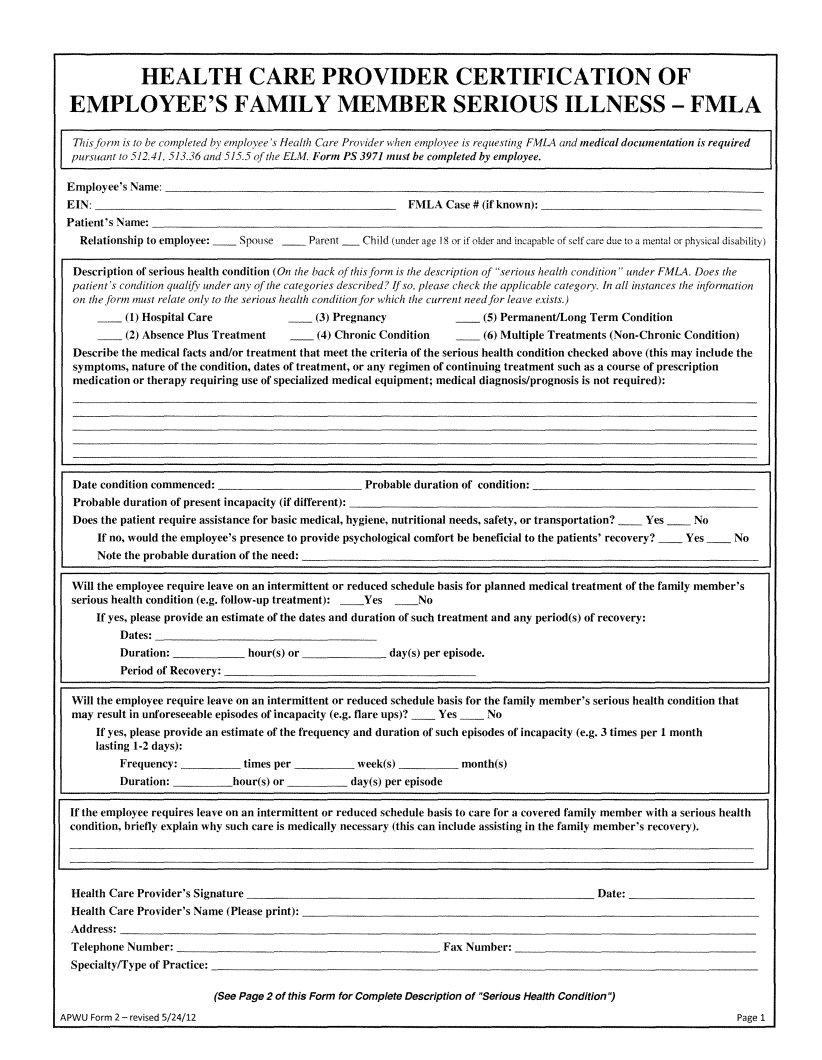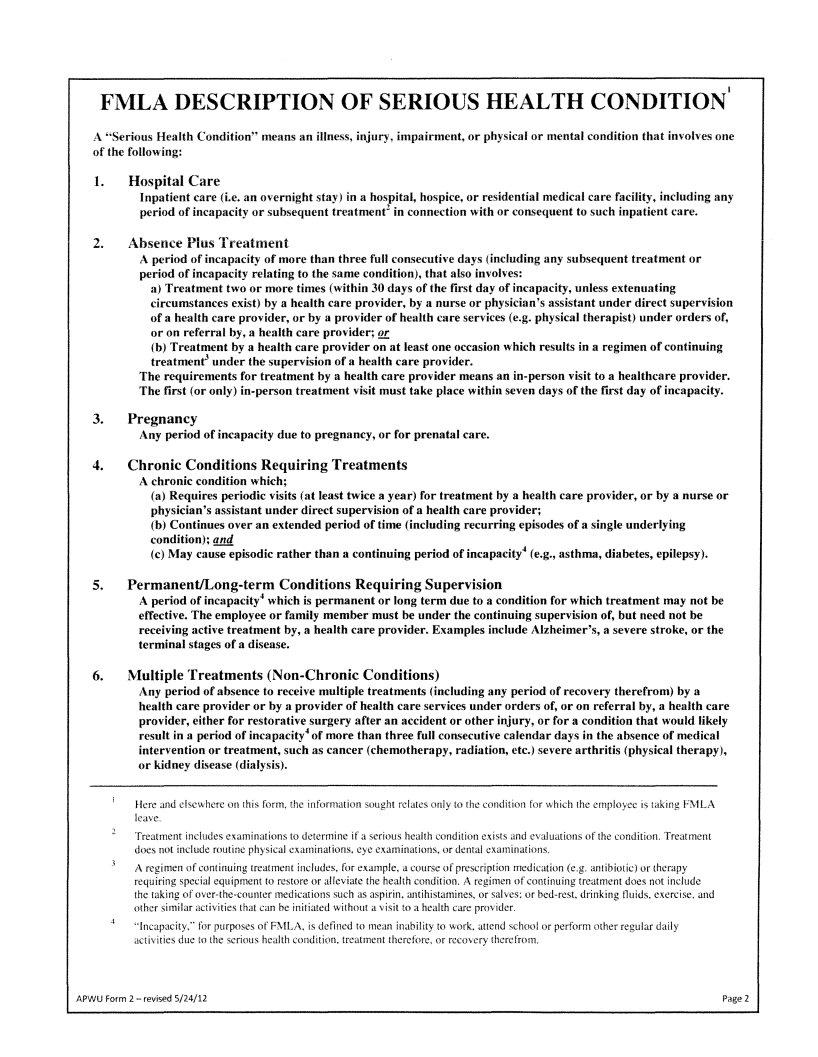Understanding the APWU 2 Form requires a dive into its purpose and usage within the framework of the Family and Medical Leave Act (FMLA). This form, titled "HEALTH CARE PROVIDER CERTIFICATION OF EMPLOYEE'S FAMILY MEMBER SERIOUS ILLNESS - FMLA," is an essential document for employees in need of leave due to a family member's serious health condition. It mandates the certification from the health care provider of the employee's family member, indicating the nature of the illness and the necessity for the employee's absence from work. The form is designed to support the employee's request for FMLA leave, providing a structured way to present medical documentation as required by specific sections of the Employee and Labor Manual (ELM). By itemizing the types of serious health conditions recognized under FMLA, such as hospital care, pregnancy, chronic conditions, and more, it provides clarity on what qualifies for leave. Additionally, it asks for detailed information about the medical facts, treatment, and the expected duration of the condition and incapacity. Moreover, the APWU 2 Form explores the need for intermittent leave or a reduced work schedule, emphasizing its role in accommodating various caregiving responsibilities. All this information plays a crucial role in the approval process of FMLA leave, aiming to ensure employees do not have to choose between job security and caring for their loved ones.
| Question | Answer |
|---|---|
| Form Name | Apwu Form 2 |
| Form Length | 2 pages |
| Fillable? | No |
| Fillable fields | 0 |
| Avg. time to fill out | 30 sec |
| Other names | PermanenULong, FMLA, incapacity4, apwu fmla forms |

HEALTH CARE PROVIDER CERTIFICATION OF
EMPLOYEE'S FAMILY MEMBER SERIOUS ILLNESS - FMLA
This form is to be completed employee's Health Care Provider when employee is requesting FML4 and medical documentation is required pursuant to 512.41,513.36 and 515.5 of the ELM. Form PS 3971 must be completed by employee.
Employee's Name:
EIN: |
FMLA Case # (if known): |
|
|
|
|
Patient's Name: |
|
|
Relationship to employee: __ Spouse __ Parent _ |
Child (under age 18 or if older and incapable of self care due to a mental or physical disability) |
|
Description of serious health condition (On the back of this form is the description of "serious health condition" under FML4. Does the patient's condition qualify under any of the categories described? if so, please check the applicable category. In all instances the information on the form must relate only to the serious health condition for which the current need for leave exists.)
__ (1) Hospital Care |
(3) Pregnancy |
__ (5) |
PermanenULong Term Condition |
(2) Absence Plus Treatment |
__ (4) Chronic Condition |
(6) |
Multiple Treatments |
Describe the medical facts and/or treatment that meet the criteria of the serious health condition checked above (this may include the symptoms, nature of the condition, dates of treatment, or any regimen of continuing treatment such as a course of prescription medication or therapy requiring use of specialized medical equipment; medical diagnosis/prognosis is not required):
Date condition commenced: |
Probable duration of condition: |
Probable duration of present incapacity (if different):
Does the patient require assistance for basic medical, hygiene, nutritional needs, safety, or transportation? __ Yes __ No
If no, would the employee's presence to provide psychological comfort be beneficial to the patients' recovery? __ Yes __ No
Note the probable duration of the need:
Will the employee require leave on an intermittent or reduced schedule basis for planned medical treatment of the family member's serious health condition (e.g.
If yes, please provide an estimate of the dates and duration of such treatment and any period(s) of recovery:
Dates: |
|
|
|
Duration: |
hour(s) or |
day(s) per episode. |
|
Period of Recovery: |
|
|
|
|
|
|
|
Will the employee require leave on an intermittent or reduced schedule basis for the family member's serious health condition that
may result in unforeseeable episodes of incapacity (e.g. flare ups)? __ Yes |
No |
If yes, please provide an estimate of the frequency and duration of such episodes of incapacity (e.g. 3 times per 1 month lasting
Frequency: |
times per |
week(s) |
month(s) |
Duration: |
hour(s) or |
day(s) per episode |
|
If the employee requires leave on an intermittent or reduced schedule basis to care for a covered family member with a serious health condition, briefly explain why such care is medically necessary (this can include assisting in the family member's recovery).
Health Care Provider's Signature |
|
Date: |
|
Health Care Provider's Name (Please print): |
|
|
|
|
|
||
Address: |
|
|
|
|
|
||
Telephone Number: |
|
Fax Number: |
|
|
|
|
|
SpecialtylType of Practice: |
|
|
|
(See Page 2 of this Form for Complete Description of "Serious Health Condition 'J
APWU Form 2 - revised 5/24/12 |
Page 1 |

t
FMLA DESCRIPTION OF SERIOUS HEALTH CONDITION
A "Serious Health Condition" means an illness, injury, impairment, or physical or mental condition that involves one of the following:
1.Hospital Care
Inpatient care (i.e. an overnight stay) in a hospital, hospice, or residential medical care facility, including any period of incapacity or subsequent treatmene in connection with or consequent to such inpatient care.
2.Absence Plus Treatment
A period of incapacity of more than three full consecutive days (including any subsequent treatment or period of incapacity relating to the same condition), that also involves:
a)Treatment two or more times (within 30 days of the first day of incapacity, unless extenuating circumstances exist) by a health care provider, by a nurse or physician's assistant under direct supervision of a health care provider, or by a provider of health care services (e.g. physical therapist) under orders of, or on referral by, a health care provider; Q!
(b)Treatment by a health care provider on at least one occasion which results in a regimen of continuing treatment' under the supervision of a health care provider.
The requirements for treatment by a health care provider means an
3.Pregnancy
Any period of incapacity due to pregnancy, or for prenatal care.
4.Chronic Conditions Requiring Treatments
A chronic condition which;
(a)Requires periodic visits (at least twice a year) for treatment by a health care provider, or by a nurse or physician's assistant under direct supervision of a health care provider;
(b)Continues over an extended period of time (including recurring episodes of a single underlying condition); and
(c)May
5.
A period of incapacity4 which is permanent or long term due to a condition for which treatment may not be effective. The employee or family member must be under the continuing supervision of, but need not be receiving active treatment by, a health care provider. Examples include Alzheimer's, a severe stroke, or the terminal stages of a disease.
6.Multiple tイ・。エュ・ョエセ
Any period of absence to receive multiple treatments (including any period of recovery therefrom) by a health care provider or by a provider of health care services under orders of, or on referral by, a health care provider, either for restorative surgery after an accident or other injury, or for a condition that would likely result in a period of incapacity4 of more than three full consecutive calendar days in the absence of medical intervention or treatment, such as cancer (chemotherapy, radiation, etc.) severe arthritis (physical therapy), or kidney disease (dialysis).
Here and elsewhere on this form, the information sought relates only to the condition for which the employee is |
FMLA |
leave, |
|
Treatment includes examinations to determine if a serious health condition exists and evaluations of the condition. Treatment does not include routine physical examinations. eye examinations, or dental examinations.
A regimen of continuing treatment includes. for example, a course of prescription medication (e.g. antibiotic) or therapy requiring special equipment to restore or alleviate the health condition. A regimen of continuing treatment does not include the taking of
"Incapacity," for purposes of FMLA, is defined to mean inability to work. attend school or perform other regular daily activities due to the serious health condition, treatment therefore, or recovery therefrom.
APWU Form 2 - revised 5/24/12 |
Page 2 |